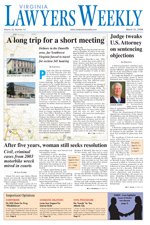Is using your office e-mail with its signature stamp the same as using office letterhead?
Should anyone down a chain of distribution that you can’t control assume that your e-mail speaks for your employer?
Office e-mail comes pretty close to company letterhead, according to one federal judge who considered the question in an unpublished opinion in Bowers v. Rector and Visitors of the University of Virginia (VLW 007-3-092), a case that has generated some buzz in Charlottesville over the past two years
“The law on the use of office e-mail systems is in its infancy,” said U.S. District Judge Norman K. Moon. He drew on precedent involving more traditional modes of communication to dismiss the First Amendment suit filed by Dena Bowers, a former employee of the human relations department at U.Va.
Bowers had used her university e-mail account to send a coworker and fellow NAACP member documents generated by that group that purportedly were critical of a university restructuring proposal. The e-mail was successively forwarded and ultimately went to hundreds of people, according to the court opinion.
The university contended that Bowers had been less than cooperative in helping to clear up the matter, and several weeks later it fired her.
In deciding how much protection the law afforded Bowers’ speech, Moon said his most serious concern arose “from the use of the signature or ‘stamp’ at the end of the e-mail that identified the sender” as a university HR employee.
Moon said that although Bowers “was not officially authorized to speak for the University, her e-mail misled others into thinking that she was,” and the court had to “hold her to the standards of those who are actually permitted to speak for government agencies: she must stick to the party line or face discipline,” Moon wrote.
“[N]obody would think to use University letterhead for personal messages, and e-mail signatures like the one in this case resemble official letterhead closely enough that the two should be treated the same way,” the judge said.
Bowers’ associational claims were not so easily dismissed, Moon wrote.
She “was justified in defending her rights and those of her fellow opponents of University restructuring by refusing to answer questions about the sources of data and preparation of her e-mail attachments.” But the associational right Bowers asserted was not clearly established, so the defendants were entitled to qualified immunity, Moon ruled.
Bowers has noted an appeal.
Subscribe to:
Post Comments (Atom)

No comments:
Post a Comment